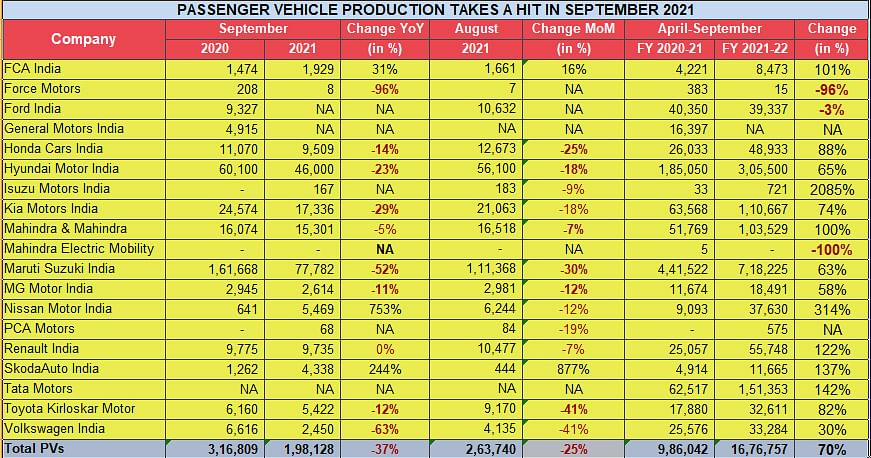Chip-impacted Indian carmakers produced 37% fewer cars in September
At 198,128 units, September output was down 25% on August’s 262,740 units and 37% below year-ago numbers. October production also likely to be down, even as the festive season opens.
September 2021 was a month when the Indian passenger vehicle industry’s manufacturing operations were sorely impacted by the crisis in supply of semiconductor chips. This has resulted in fewer vehicles exiting plants and entering dealer showrooms and comes at a time when the festive season has begun in India.
Latest industry production data reveals that Indian carmakers produced a total of 198,128 units last month, down a sizeable 37% – or 118,681 units – on September 2020’s 316,809 units (see data table below). Compared to August 2021’s 263,740 units, month-on-month production saw a decline of 25%.
The loss of production was led by market leader Maruti Suzuki India which produced 77,782 units – 47,884 cars, 21,873 UVs and 8,025 vans – down 52% (September 2020: 161,668) as a result of shortage of electronic components due to the chip crisis. Compared to August’s 111,368 units, September output was down 30%; October output is likely to be impacted too.
On September 1, Maruti Suzuki had issued a statement saying “Owing to a supply constraint of electronic components due to the semiconductor shortage situation, the company is expecting an adverse impact on vehicle production in September in both Haryana and its contract manufacturing company, Suzuki Motor Gujarat (SMG) in Gujarat. Though the situation is quite dynamic, it is currently estimated that the total vehicle production volume across both locations could be around 40% of normal production.”
Maruti Suzuki India’s two plants at Gurgaon and Manesar in Haryana have a combined manufacturing capacity of 1,580,000 units while SMG plant has a 500,000 units capacity. This adds up to a little over 2 million units per annum (2,080,000). All put together, the three plants’ monthly production is estimated at a little over 173,000 units.
Meanwhile, Mahindra & Mahindra, which had announced seven zero-production days in September 2021, due to the semiconductor crisis, produced 15,301 units in September 2021, down 5% on year-ago numbers (16,074) and 7% on August’s 16,518 units.
While Hyundai Motor India, the No. 2 PV player, has not confirmed production slowdowns due to the chip issue, the company produced 23% fewer vehicles in September 2021 (46,000) as compared to September 2020 (60,100) and 18% less than August 2021’s 56,100 units.
Its Korean sibling Kia Motors India too produced 29% fewer cars YoY in September – 17,336 units – and 18% less than August 2021’s 21,063 units.
It is estimated that Tata Motors, which has not been providing monthly production or sales numbers since July 2020, and is currently seeing strong demand for its PVs would not have seen a production decline.
The data table below reveals that MG Motor India, Toyota Kirloskar Motor and Volkswagen India were the other OEMs who recorded production declines last month. Skoda Auto India, which is seeing robust demand for its Kushaq, has trebled production over a year.
It is mid-October now and the festive season has begun in earnest. While there has been an uptick in consumer interest and demand, particularly for recently launched models, long waiting periods are striking a discordant note. This development confirms what FADA president Vinkesh Gulati told Autocar Professional last month. He said due to the sizeable supply-demand mismatch due to the prevailing semiconductor supply chain problem, sales in the festive season will be impacted despite there being a revival of demand.

RELATED ARTICLES
Maruti's Kharkhoda Plant construction in full swing
Maruti Suzuki has proposed to spend more than Rs 7,000 crore for the construction and commissioning of this plant which ...
July 2024 From R&D incentives to EV infrastructure: What auto components industry expects from Budget 2024
July 2024 From R&D incentives to EV infrastructure: What auto components industry expects from Budget 2024
Vemuri Young Artist from India Recognized as one of the Winners at 16th Global Toyota Dream Car Art Contest
Vemuri Young Artist from India Recognized as one of the Winners at 16th Global Toyota Dream Car Art Contest






 16 Oct 2021
16 Oct 2021
 4094 Views
4094 Views





 Autocar Pro News Desk
Autocar Pro News Desk




